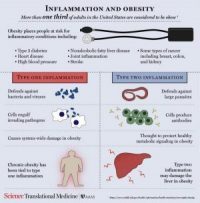- Home
- Editorial
- News
- Practice Guidelines
- Anesthesiology Guidelines
- Cancer Guidelines
- Cardiac Sciences Guidelines
- Critical Care Guidelines
- Dentistry Guidelines
- Dermatology Guidelines
- Diabetes and Endo Guidelines
- Diagnostics Guidelines
- ENT Guidelines
- Featured Practice Guidelines
- Gastroenterology Guidelines
- Geriatrics Guidelines
- Medicine Guidelines
- Nephrology Guidelines
- Neurosciences Guidelines
- Obs and Gynae Guidelines
- Ophthalmology Guidelines
- Orthopaedics Guidelines
- Paediatrics Guidelines
- Psychiatry Guidelines
- Pulmonology Guidelines
- Radiology Guidelines
- Surgery Guidelines
- Urology Guidelines
Type 2 inflammation might be good for the belly but bad for the liver

Type Two Inflammation Might be Good for the Belly But Bad for the Liver An inflammatory response once thought to protect against obesity could exacerbate non-alcoholic fatty liver disease (NAFLD), which is why new findings suggest some targeted treatments for metabolic syndrome might need to be reevaluated. NAFLD is the most common type of progressive liver disease in developed countries and the second leading indication for liver transplantation. What's more, direct medical costs associated with NAFLD total as much as $103 billion every year in the United States, and no drugs are approved to treat the 64 million people in the nation living with the condition. Because obesity, NAFLD, and inflammation are closely linked, ongoing efforts have attempted to develop interventions designed to modulate affected individuals' immune responses. Multiple types of inflammation exist, and type 1 has been linked to insulin resistance in obesity, while type 2 is thought to maintain healthy metabolic signaling in fatty tissues (in addition to protecting the body against parasitic worms).
Here, Kevin Hart and colleagues made an unexpected discovery: that genetic predisposition towards type 1 inflammation protected mice against liver fibrosis from NAFLD following consumption of a high-fat diet. Yet, surprisingly, Hart et al. found evidence for type 2 inflammation in biopsy samples from 56 human patients with severe liver fibrosis from NAFLD. An anti-inflammatory therapy called TGF- β blockade reduced markers for NAFLD-associated fibrosis in mice fed a high fat diet, but increased type 2 inflammation in the animals' livers. The authors say that signs of type 2 inflammation in the liver could be used as clinical indicators to predict NAFLD progression.

Disclaimer: This site is primarily intended for healthcare professionals. Any content/information on this website does not replace the advice of medical and/or health professionals and should not be construed as medical/diagnostic advice/endorsement or prescription. Use of this site is subject to our terms of use, privacy policy, advertisement policy. © 2020 Minerva Medical Treatment Pvt Ltd